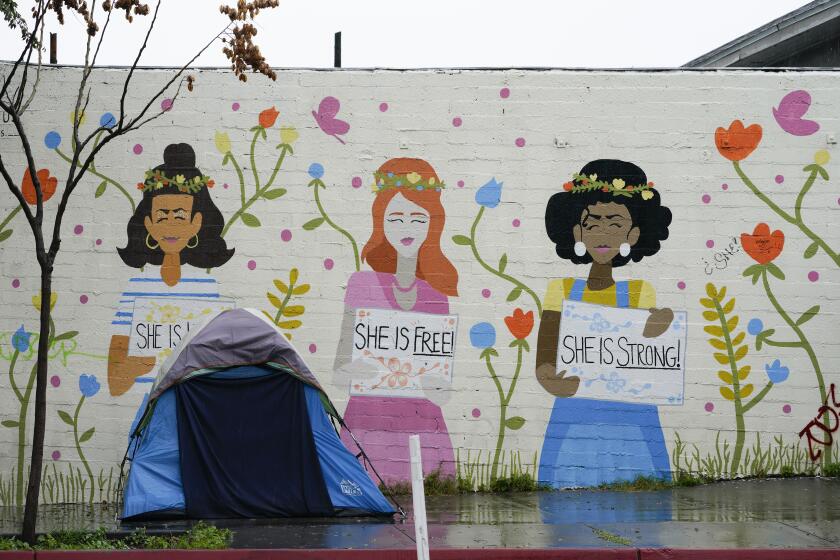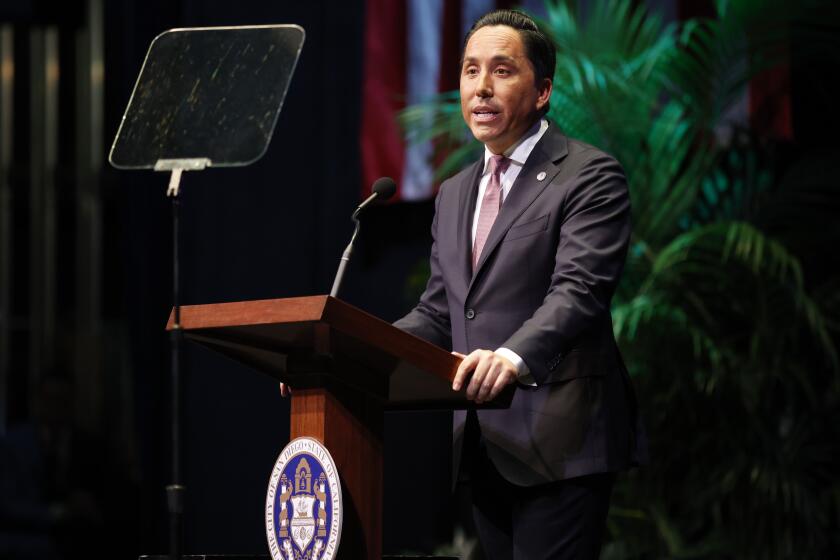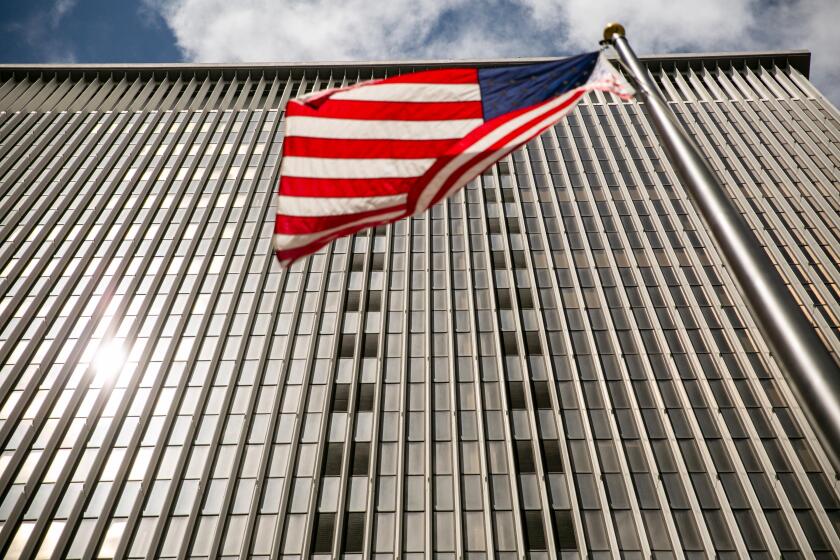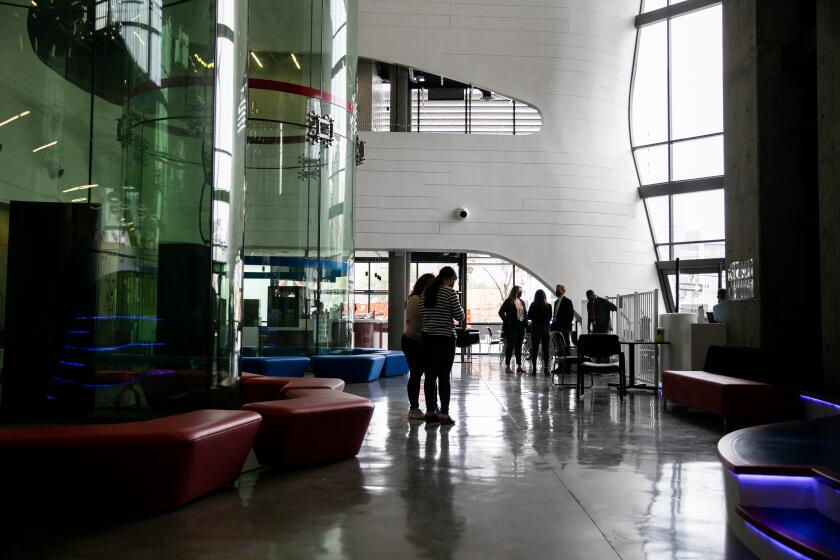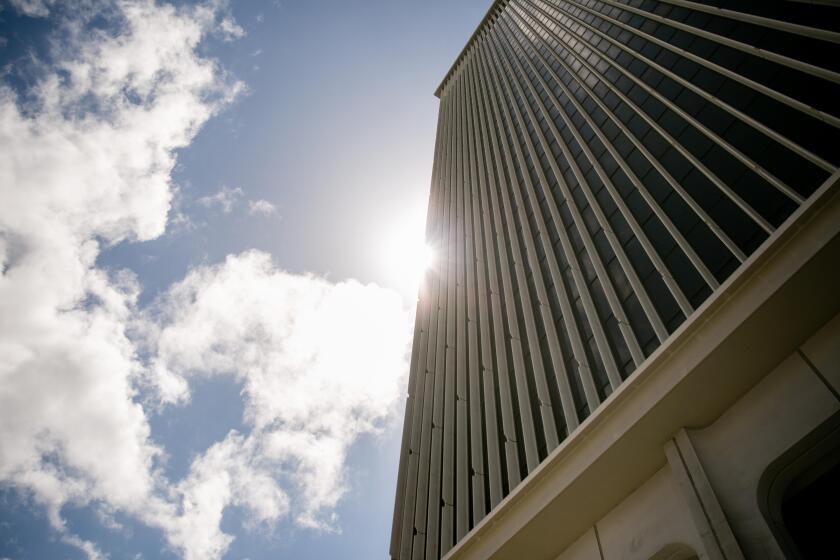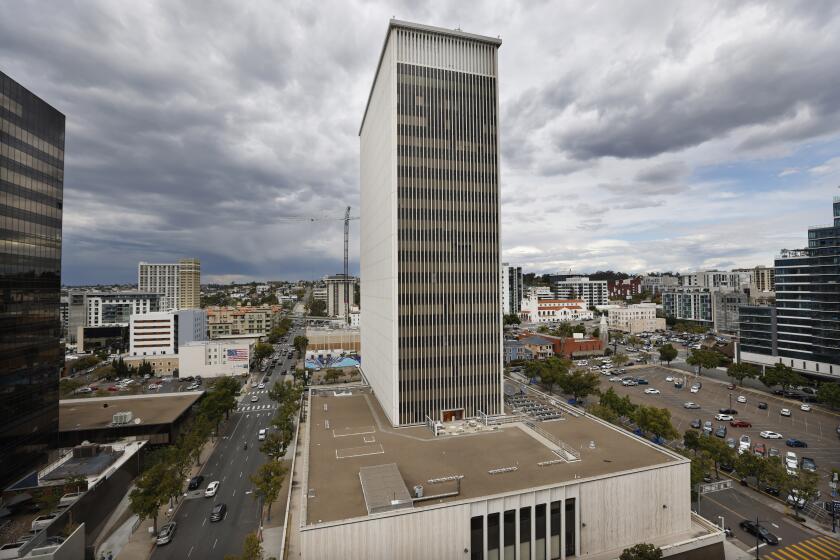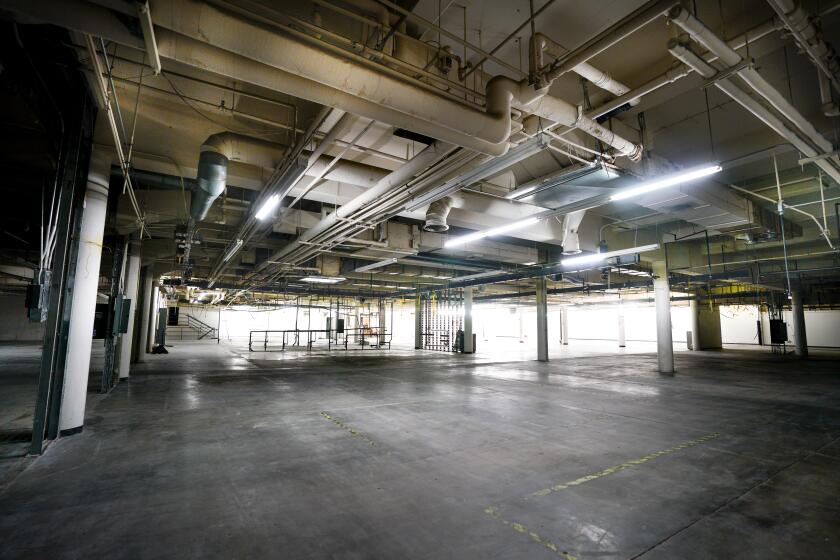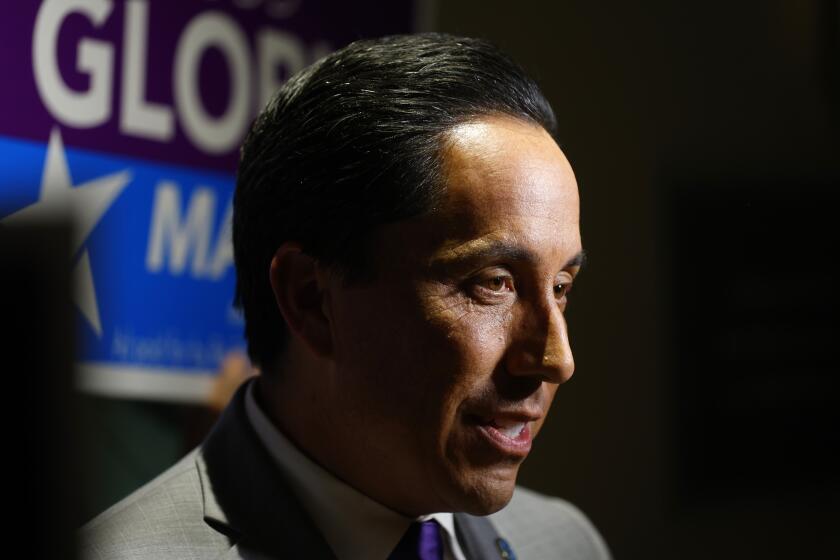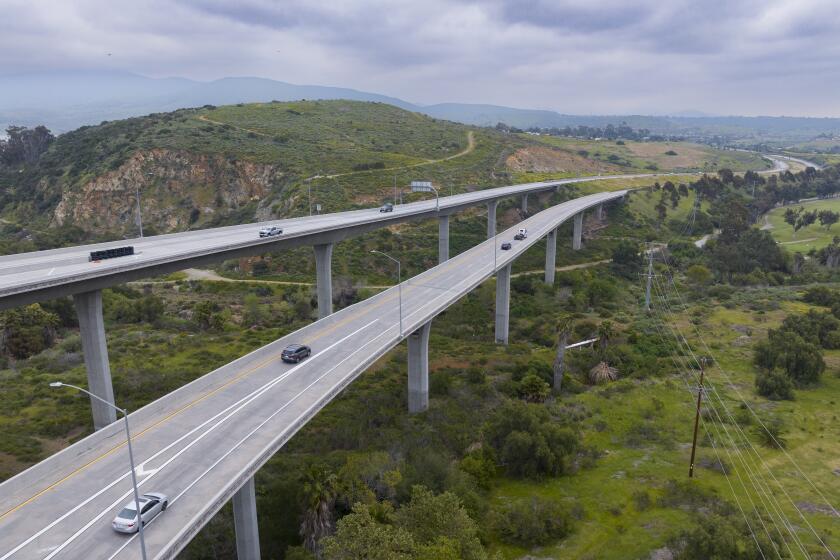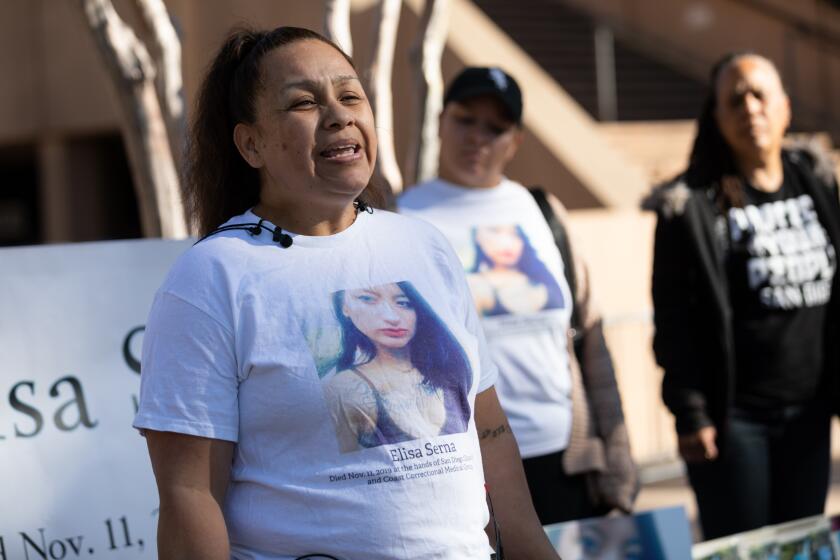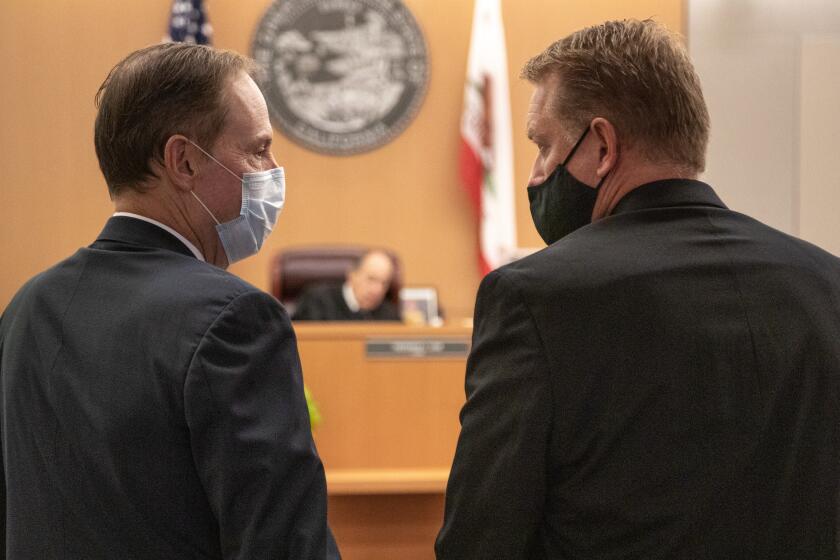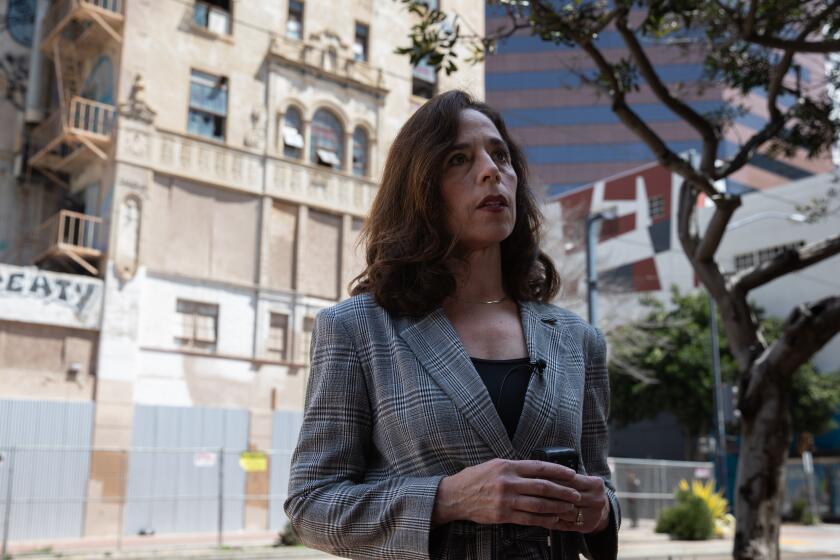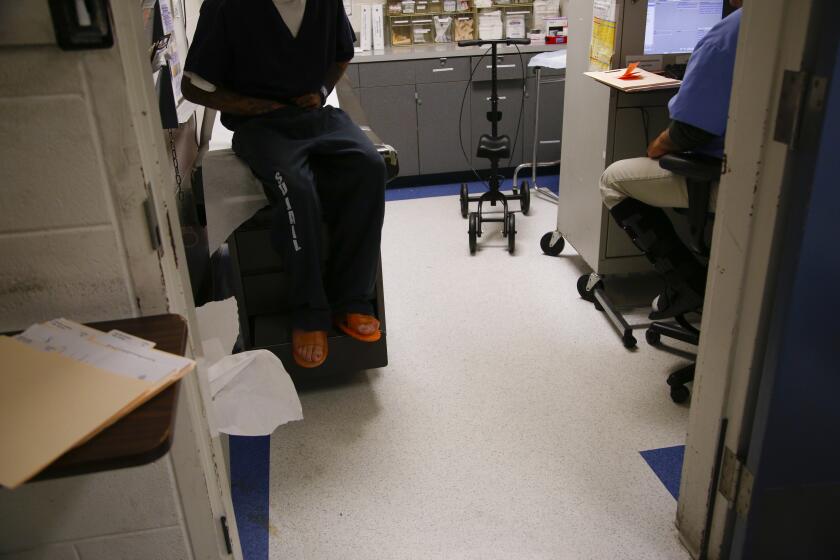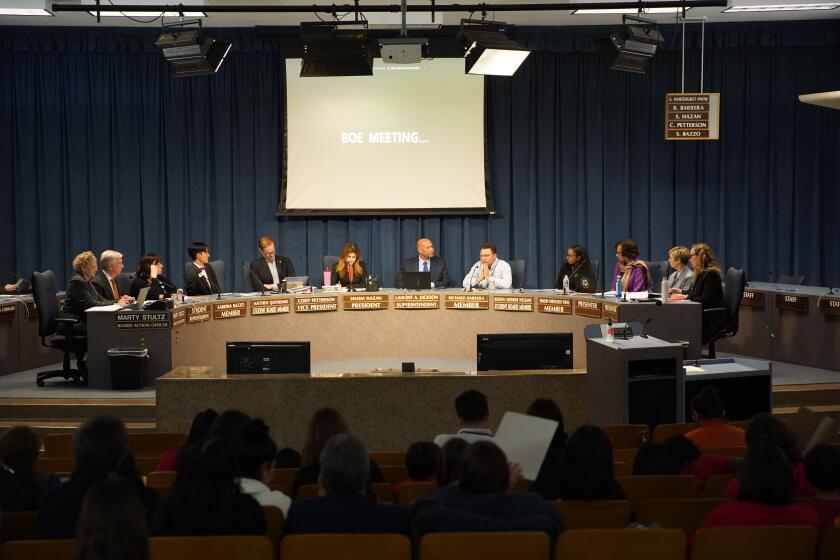San Diego’s dubious real estate track record slows down mayor’s proposed new 1,000-bed shelter
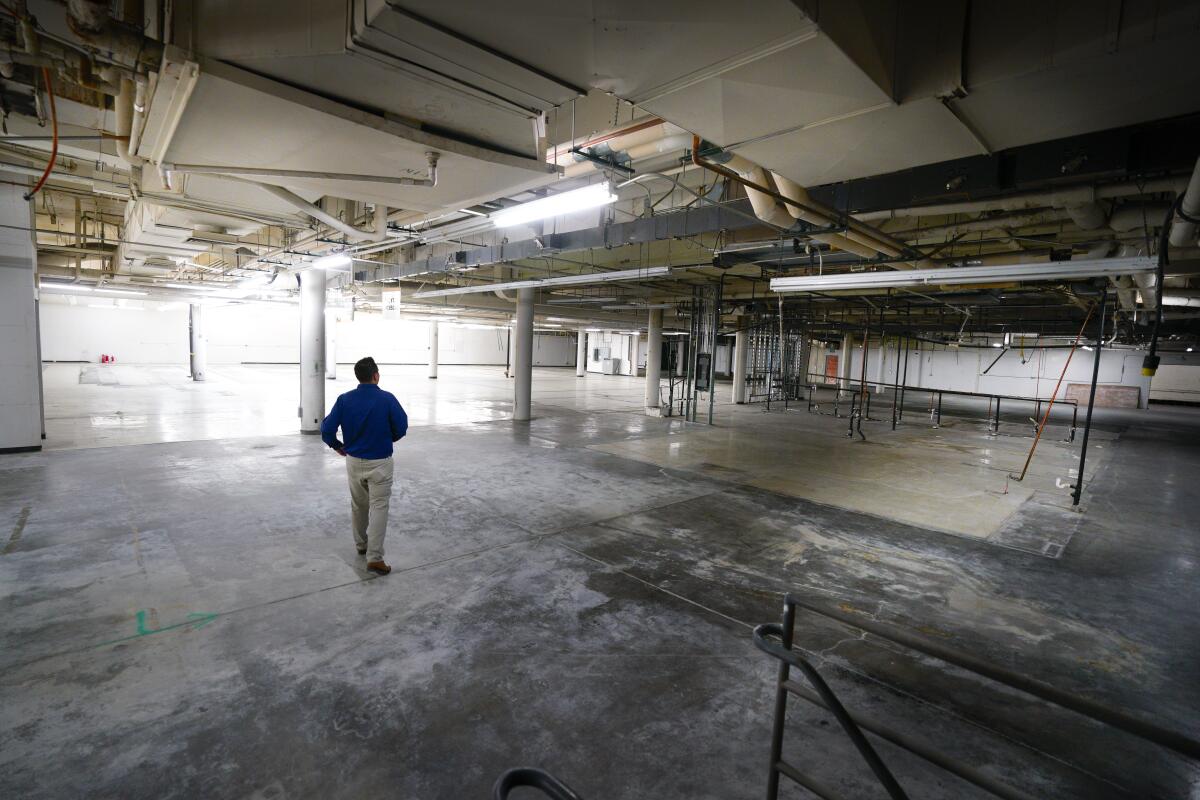
Questions nag the city as it seeks to open a new facility to serve homeless people in a long-vacant warehouse north of downtown
It is the biggest and most expensive effort yet aimed at tackling the persistent crisis in homelessness that has confronted San Diego for years: a $1 billion-plus shelter program at the cusp of downtown to serve all comers, no questions asked.
But more than a week after Mayor Todd Gloria rolled out his ambitious plan to convert a long-vacant warehouse along Kettner Boulevard into a 1,000-bed haven for those with no place to live, the lack of details surrounding the project may be overshadowing the idea.
The absence of basic information has given key policymakers pause.
This story is for subscribers
We offer subscribers exclusive access to our best journalism.
Thank you for your support.
The 35-year lease was scheduled to be presented to the City Council’s land use and housing committee for approval this Thursday but was withdrawn from the agenda Friday in favor of further review.
No future date has been provided.
The 65,000-square-foot warehouse sold less than two weeks ago for just over $13 million, records show. But Gloria is pushing a lengthy lease starting at $1.9 million a year, with annual 3 percent increases.
With the escalating rent, payments would exceed $92 million over the next three and a half decades. Two five-year options to extend the deal would add almost $30 million to that cost.
Gloria spokesperson Rachel Laing said that the lease terms were based on an extensive review of available properties across the region and that the length of the agreement would provide the city flexibility if conditions change in coming years.
“In the event that the city of San Diego solves homelessness and shelter is no longer needed, this asset could be repurposed for a number of uses,” Laing said by email.
The mayor also has not said how he would cover the estimated $30 million it would cost each year to operate the facility, beyond indicating that the money would come from existing revenue and, potentially, future charitable donations.
In all, the shelter would cost the city more than $1.1 billion over the next 35 years, roughly $2,700 per month per bed over the life of the lease.
How San Diego reports and assesses its spending on homelessness was questioned by the California State Auditor in a report last week.
State auditors found the city spent hundreds of millions of dollars fighting homelessness without adequately tracking the spending or properly evaluating the effectiveness of its programs.
Despite broad needs across San Diego, the city is sitting on more than $50 million in unspent state and federal funds, the auditor says
Besides that, the city is facing a structural budget deficit of $200 million for the fiscal year that begins July 1, and the Mayor’s Office is already on the record saying the new shelter would not draw any resources away from existing homelessness programs.
“This will be additive,” Laing told The San Diego Union-Tribune the day the project was announced.
But a draft spending plan released by the mayor this week shows the city slicing millions of dollars from the San Diego Housing Commission, which met Friday to discuss impacts of the potential cuts.
Gloria has offered few details on how the deal for the future shelter site came together.
Laing said the landlord approached the city last October, months before he took possession of the property, apparently after Gloria said he planned to expand the city’s shelter capacity.
City real estate experts began their review, touring the property in December and launching a market survey that led to the proposed lease.
“A major part of the value of this proposal is the incomparable speed with which it can be deployed as a shelter that gets 1,000 homeless San Diegans off the streets,” Laing said in her response to a series of questions last week.
The addition of 1,000 new shelter beds was a key pledge in the State of the City address Gloria delivered earlier this year.
In his fourth annual State of the City speech, Mayor Todd Gloria touted progress toward existing goals. Re-election opponents, one of whom was delivering a live rebuttal after it, said it wasn’t enough.
The Mayor’s Office said an analysis of the space inside the Kettner Boulevard warehouse showed it would support 1,000 beds once an estimated $18 million in tenant improvements are completed.
“The estimate was prepared by the landowner’s architect and contractors,” Laing noted.
Several elected officials and their aides said they only learned about the proposed facility from news reports, rather than the Mayor’s Office.
Councilmember Kent Lee, who chairs the land use and housing committee that had been scheduled to consider the public investment this coming Thursday, commended the mayor’s effort to expand the city’s shelter capacity.
But he is not yet ready to sign off on the deal.
“I expect the City Council to carefully vet this real estate proposal including the Independent Budget Analyst’s report, the long-term fiscal impacts and how this fits into the overall shelter program,” he said in an email before the matter was taken off the agenda.
Council President Sean Elo-Rivera said he has questions about how the lease terms were reached and whether they can be amended. He also wants more information about who would operate the facility and how the city will absorb those costs.
“It’s critical to me that the council has the time and space to fully vet both the proposed lease and shelter,” he said.
“I’ve requested a closed-session discussion of the terms and conditions of the lease and expect the council to have robust open-session discussions about the operational plans and budgetary impacts of the shelter,” Elo-Rivera added.
Charles Modica, the city’s independent budget analyst, said he was provided a copy of the lease on April 4 and would not have completed his review before the committee hearing that has now been postponed.
“Addressing the city’s homelessness crisis is an obviously urgent need, but it’s crucial that the city not rush into a long-term lease agreement without doing its full due diligence, especially given our past history,” he said.
Modica said a thorough review of the lease and renovations plans takes time. “Two weeks is not sufficient time for us to complete a full analysis.”
The independent budget analyst is supposed to play a critical role in decisions related to San Diego city real estate deals, after an audit released in 2021 that examined a number of prior, questionable transactions.
Faulconer and senior aides declined to be interviewed by city auditors
Gloria agreed with the audit‘s recommendations, including a plan that the independent budget expert would review the terms of any major real estate deals he sought.
His spokesperson said the mayor is complying with the 2021 audit’s suggestions, pointing to Modica’s ongoing evaluation.
“Their findings will be taken into consideration,” Laing wrote.
‘An immediate impact’
County property records show the warehouse near the corner of Kettner Boulevard and Vine Street was owned for years by CALFA Holdings Five LLC of La Jolla.
The appraised value is listed as just under $8.4 million, although that will climb in the wake of the April 2 transaction.
According to tax records, the property sold for $13.25 million just two days before Gloria’s announcement outside the building.
For the record:
10:50 a.m. April 15, 2024A previous version of this story’s lead photo caption incorrectly identified the person pictured as Mayor Todd Gloria. It is city media coordinator Matt Hoffman.
Laing said the property was not offered to the city for purchase, only as a long-term lease.
“The city would not pursue negotiations with the then-property owner for a property that was already in escrow, as to do so would be unethical,” she said.
The buyer was recorded April 2 as Kettner Vine Creative House LLC, a limited liability company established March 15 by investor Douglas Hamm.
Hamm, a University of San Diego finance and philosophy graduate who founded and operates multiple companies, could not be reached for comment.
Creative House, the main company behind many of Hamm’s holdings, promotes itself as a diversified investment and development company. It boasts this quote from Thomas Edison on its website: “Discontent is the first necessity of progress.”
Hamm does not appear to be politically active; the Mayor’s Office said Gloria has no relationship with him, and he does not appear in recent lobbying disclosures or campaign filings. Hamm and his firms have been sued a handful of times over the past decade in what appear to be routine legal disputes, court records show.
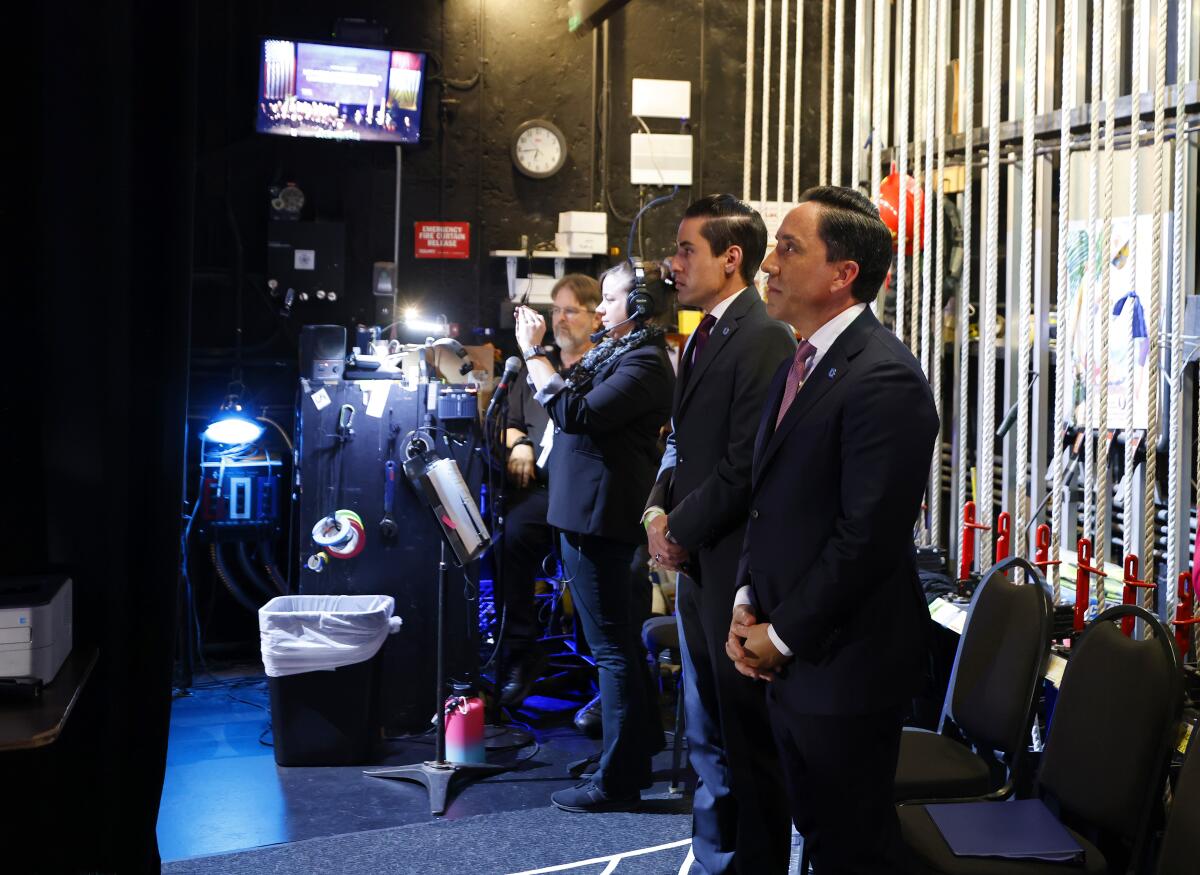
In his public statements about the proposed shelter, Gloria said the project fulfills a pledge he made early this year in his State of the City address to add at least 1,000 beds to San Diego’s existing shelter system.
“Substantially increasing our shelter capacity will have an immediate impact as we work on the other aspects of our comprehensive approach to ending homelessness,” the mayor said outside the planned shelter.
He did not mention that two current city shelters are meanwhile scheduled to be closed — a bridge shelter on Newton Avenue and temporary quarters at Golden Hall, which account for 660 beds combined.
The city also has longer-term plans to close the temporary women’s shelter at the former Central Library later this year and redevelop it.
Regardless of the number of shelter beds available across San Diego, national advocates said a more effective way to fight homelessness is to create more housing and assistance programs that prevent homelessness.
Alex Visotzky, a senior policy fellow at the National Alliance to End Homelessness, said his research has shown that programs need to provide choices that promote privacy, safety and a sense of agency to be successful.
“We are concerned that this proposal offers neither privacy nor safety and fails to learn from the public health crises of the last few years, which show that large congregate shelters often spread communicable diseases,” Visotzky said.
“Given the far from trivial costs of this proposal, we would encourage San Diego to consider alternatives, including rental subsidies and shallow subsidy programs that can place the same number of individuals into permanent housing for less cost,” he said.
At a public meeting Friday, San Diego Housing Commission officials wrestled with the budget plan put forward by Gloria.
Executive vice president Suket Dayal told commissioners the agency received $48 million for delivering homelessness services this year, but was proposed to receive $27.9 million in the new year.
“That would be a percentage cut of of 41.8 percent from Fiscal Year 24 levels,” Dayal said.
Overwhelming failure
Independent reviews of San Diego real estate transactions became a serious issue in 2021, when City Auditor Andy Hanau released a scathing report detailing years of mismanagement related to the publicly owned or leased property.
The report singled out a series of deals recommended by former mayor Kevin Faulconer and approved by City Attorney Mara Elliott and the City Council.
Most pertinent to the city’s fight against homelessness may have been the Faulconer administration’s request in 2018 to buy a former skydiving facility along Imperial Avenue without the benefit of an independent appraisal.
The city expects to issue a request for proposals for the Homelessness Response Center in East Village sometime next year. Developers will be required to propose projects with 100 percent of residential units deed-restricted for low- and very low-income families.
Instead, the Mayor’s Office told the council the building was worth up to $22 million, with little more than what’s called a broker’s opinion of value provided by the seller.
The City Council agreed to spend $7 million on the three-story property, whose interior was dominated by two giant wind tunnels, to use it as a housing navigation center.
The shuttered skydiving facility was supposed to be a one-stop resource people experiencing homelessness could use to sign up for housing benefits and other services. It took almost two years to open, and the initial operator was driven out less than a year later.
The San Diego Housing Commission has been providing services to unhoused people from the site since then.
Now the property is being floated as a future site for affordable housing, and the city is expected to make it available for development later this year. If that happens, the skydiving facility would have to be demolished to make way for apartments.
The audit also noted failures in the city’s handling of a 2017 lease for a repair yard in Kearny Mesa and the purchase of a hotel along Palm Avenue the same year.
But the overwhelming failure cited in the July 2021 audit was the city’s lease-to-own purchase of the former Sempra Energy headquarters at 101 Ash St., a building that remains unusable.
The city of San Diego’s 2016 lease-to-own agreement for the downtown high-rise has been the subject of litigation, criminal investigation and public scrutiny for years.
Hanau found the Faulconer administration withheld key information from council members when seeking their vote to acquire the 19-story office tower. He also said the city relied solely on the seller for information about the property’s condition.
The real estate department “misrepresented the condition of 101 Ash — staff told City Council that the building was Class A, in excellent condition, and only in need of $10,000 of repairs,” the audit said.
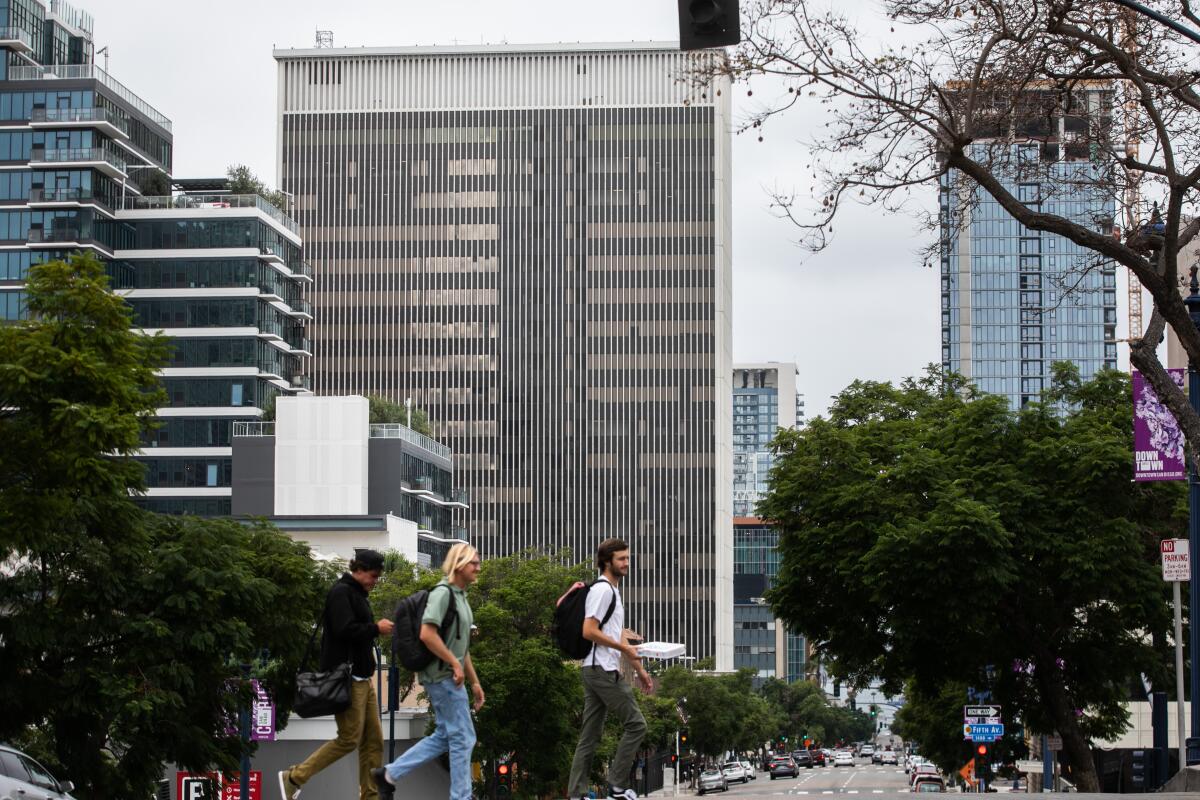
Civil lawsuits and a criminal investigation into the Ash Street transaction came to an abrupt end just over a year ago, months after the council approved a plan by the mayor to buy out the lease for 100 cents on the dollar against the legal recommendation of the city attorney.
The building has now cost taxpayers more than $200 million, even though it cannot be safely occupied due to asbestos and other issues. It will cost tens of millions more as the city makes payments against the 30-year bonds it sold to pay off the Ash Street lease.
Meanwhile, the mayor’s plan to remake the office tower into an affordable housing destination has fizzled. The city broke off negotiations with would-be developer Reven Capital on Thursday, after the two sides reached an impasse on the terms of the deal.
The city and developer Reven Capital could not agree on the terms of an exclusive negotiating agreement, as the city was unwilling to pick up the tab for upfront project costs
The Mayor’s Office said it does not expect any such surprises related to the Kettner property’s condition.
“The building has been inspected by city staff along with architects and contractors from the landowner,” Laing said. “The building owner had an environmental site assessment completed for the property, which is 5,000 pages long.”
According to a summary of the assessment provided by the Mayor’s Office, the abandoned warehouse is adjacent to two properties that have been the subject of an ongoing remediation by the state Department of Toxic Substances Control since 1993.
Analysts discovered some dangerous compounds in the air inside the building and in the groundwater nearby, but the assessment concludes that the property could be safely used as a shelter with proper mitigation.
“Potential environmental concerns were identified in association with the former use (printing and coatings facilities utilizing solvents) of the southern block,” the assessment notes.
High lease cost
Faulconer left office in late 2020 without resolving the issues surrounding 101 Ash St., but he never left the public eye. He is challenging Terra Lawson-Remer for her seat on the San Diego County Board of Supervisors.
Gloria, who made the initial motion to approve the Ash Street deal while he was serving on the City Council in 2016, was elected mayor and made the decision to buy out the lease at full price.
But one casualty of the Ash Street scandal was Cybele Thompson, who served as the city’s director of real estate assets in the Faulconer administration. She resigned in August 2020, when the extent of the building’s problems became widely publicized.
Thompson, who some city officials said had been made a scapegoat during the Ash Street debacle, wrote a memo and created an acquisition checklist before leaving city hall. It spelled out recommendations to follow whenever the city wanted to pursue a major real estate deal.
“My interest in drafting this council policy was to protect staff from being pushed, in our current strong-mayor form of government, to present projects without full transparency, and to protect the city council and the public,” she said in an interview.
Thompson said her suggestions to prevent future Ash Street-like deals were all but ignored.
“Unfortunately this memo was never acted upon, and we continue to see major real estate transactions pushed through council, such as the Sports Arena, 101 Ash and CCP purchases and, most recently, Kettner and Vine,” she said.
The mayor’s public announcements “do not provide even the minimum real estate industry standard details to enable City Council to make an informed decision,” Thompson said.
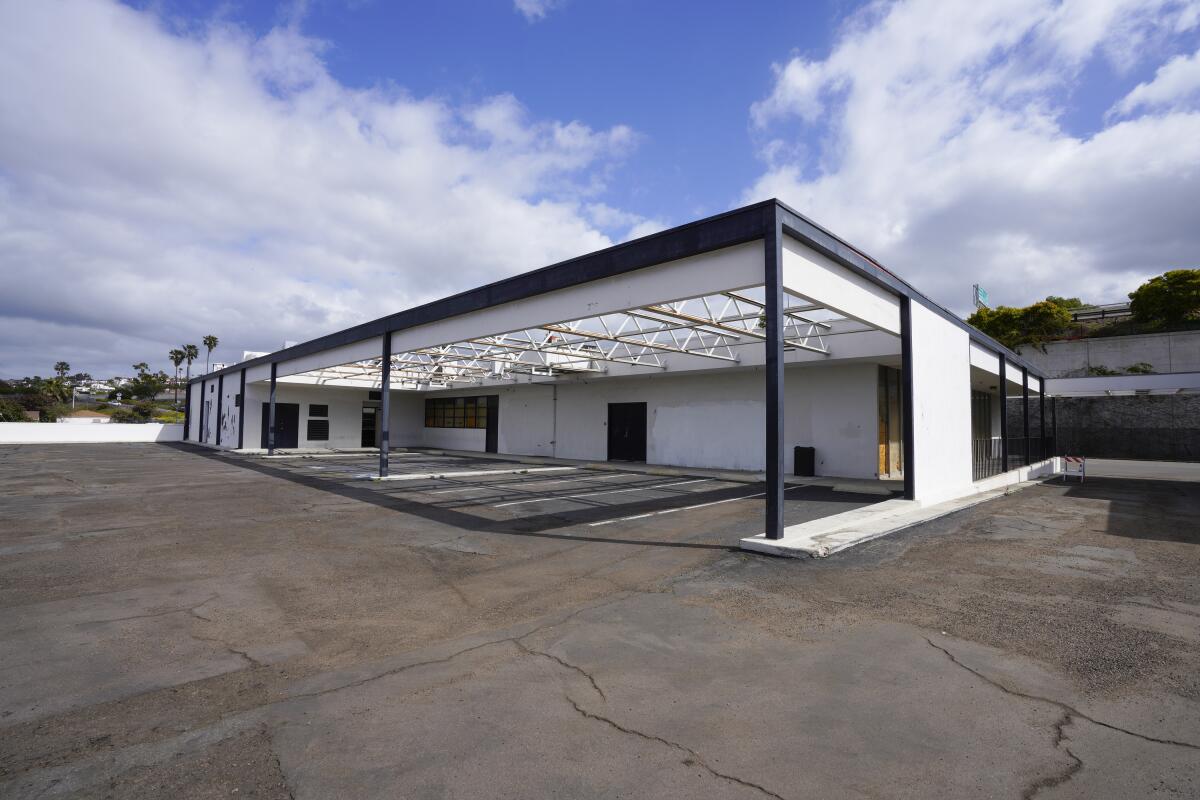
The Gloria administration said city experts relied on market-accepted public databases like Costar and LoopNet to conduct property searches for potential shelter sites and to explore acceptable lease terms.
“City staff experienced in real estate and lease transactions negotiated this lease,” spokesperson Laing wrote in her response. “The City Attorney’s Office was a partner in developing the lease.”
City Attorney Elliott said in a statement Thursday that she continues to seek the information she needs to properly evaluate the proposed shelter deal.
“Before the council considers approval of this lease, the City Attorney’s Office will identify the known significant legal risks regarding this proposed transaction in writing to the City Council,” she said.
The Mayor’s Office provided a spreadsheet showing 16 properties available for lease across the region and nine others being offered for sale that were evaluated by city staff. Only three were in the city of San Diego.
The potential leases ranged in price from 98 cents to $1.85 per square foot each month; the properties listed for sale were available for between $275 and $386 per square foot.
The Kettner Boulevard warehouse changed hands April 2 for about $203 per square foot, county records show — notably less than the sample parcels cited in the market review provided by the Mayor’s Office.
Meanwhile, lease terms for the proposed shelter would cost just over $2.40 per square foot each month, which is significantly higher than the other lease opportunities reviewed by the city real estate staff.
Hanau, who wrote the 2021 recommendations to protect the city in its real estate dealings, said he was grateful the mayor is on the hunt for new shelter space.
However, “city management is responsible for ensuring sufficient due diligence is completed, providing the relevant reports to the City Council and the public, and explaining why any key due diligence steps were unnecessary for the proposed transaction,” he said.
Get Essential San Diego, weekday mornings
Get top headlines from the Union-Tribune in your inbox weekday mornings, including top news, local, sports, business, entertainment and opinion.
You may occasionally receive promotional content from the San Diego Union-Tribune.
